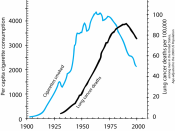Good morning Professor Skaggs and class. I'm sure there are some of you in this very classroom who are addicted to this expensive habit I'm about to talk about. Smoking. Now, I'm sure that all of you have heard of the health risks involved with smoking, and I'm sure that you are all sick and tired of hearing about it. Well, I'm sorry to say, you're going to hear it again. And maybe when I'm through, you will think twice about lighting a cigarette after class.
Smoking is the most preventable cause of death in the United States. In 1995 alone, approximately 2.1 million people in developed countries died as a result of smoking. Tobacco use is responsible for nearly one in five deaths in the U.S. and results in an annual cost of more than $50 billion in direct medical expenses. Nationally, smoking results in more than 5 million years of potential life loss each year.
And more than 5 million children living today will die prematurely because of a decision they will make as adolescents-the decision to start smoking.
Since 1987, more women have died each year from lung cancer than breast cancer, which was the major cause of cancer death in women for over 40 years! And did you know that each year smoking kills more people than AIDS, alcohol, drug abuse, car crashes, murders, suicides, and fires COMBINED!!!!!!!! Approximately half of all continuing smokers will die in middle, age losing an average of 20-25 years of life expectancy.
Lung cancer mortality rates are about 23 times higher for current male smokers and 13 times higher for current female smokers compared to lifelong never smokers. In addition to being responsible for 87% of lung cancers, smoking is also associated with cancers of the mouth, pharynx, larynx, esophagus, pancreas, uterine cervix, kidney, and bladder. I'm going to pass around a pie chart, and you will see that lung caner is the leading cause of death in the U.S. Studies have also demonstrated that "women who use tobacco during pregnancy are more likely to have adverse birth outcomes, including low birth weight babies, and low birth weight is a leading cause of death among infants."ÃÂ Also, pregnant women who smoke are more likely to have a miscarriage, stillborn baby, or an infant that dies soon after birth.
For the more than 80% of adults who ever smoked, cigarette smoking began by age 18, and more than half were already smoking by that age. Something else that is disturbing is the fact that more than 3 million young people under age 18 smoke half a billion cigarettes each year and that more than one-half of them consider themselves dependent on cigarettes (Pass around graph).
Something else that caught my attention was a statement I found concerning the tobacco industry and young smokers: "Although the tobacco industry claims that it does not want young people to smoke, their own documents, recently released to the public, state that they have had a long standing interest in young smokers."ÃÂ Now, to me, this sounds like that the tobacco industry is admitting that their advertisement for cigarettes was really targeted toward adolescents. And another recent study shows, "That the three most heavily advertised brands are the same three brands most chosen by teens-Camels, Marlboro, and Newport."ÃÂ If you smoke, which brand do you use? Probably one of these. Now you be the judge on whether an advertisement influences our decision-making.
And now I'm going to pass around pictures of a non-smokers lung and a smoker's lung. Notice the difference in appearance of the two.
Quitting smoking now can greatly reduce your risk of developing lung cancer, having a heart attack, or stroke. With in a few days or weeks there is an improvement in the senses of taste and smell, a gradual reduction in the amount of morning coughing, and less shortness of breath during exercise. Although, lung damage, caused by chronic bronchitis or emphysema, cannot be reversed once it has occurred, its progress is stopped. If a person who stops smoking lives for ten years, his/her chance of developing lung cancer is no more than someone who has never smoked. Also, the people you live with will be healthier and you will have extra money to spend on things other than cigarettes.
In conclusion, I hope that I have raised some awareness and hope that you will take these factors into consideration before you decide to light up a cigarette today.
Thank you.
Works Cited American Caner Society-Cancer Facts and Figures 1998: Tobacco Use April 18, 2001 Tobacco Use by Children: April 18, 2001 WebMd "ÃÂ Smoking of tobacco: April 18, 2001 Yahoo Health April 18, 2001





